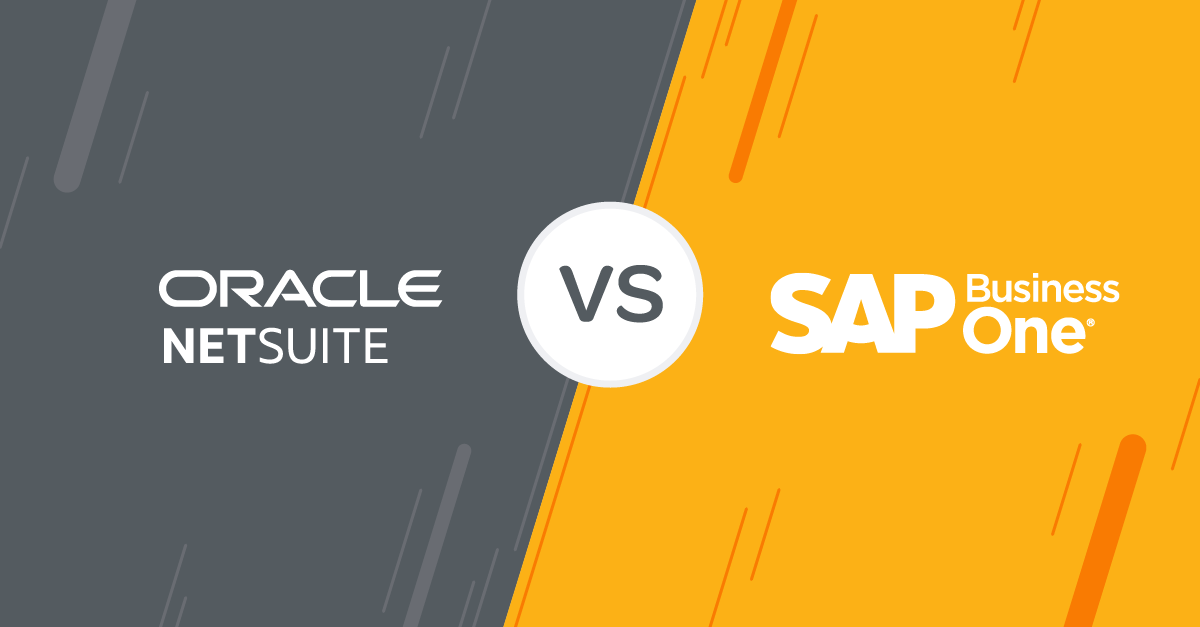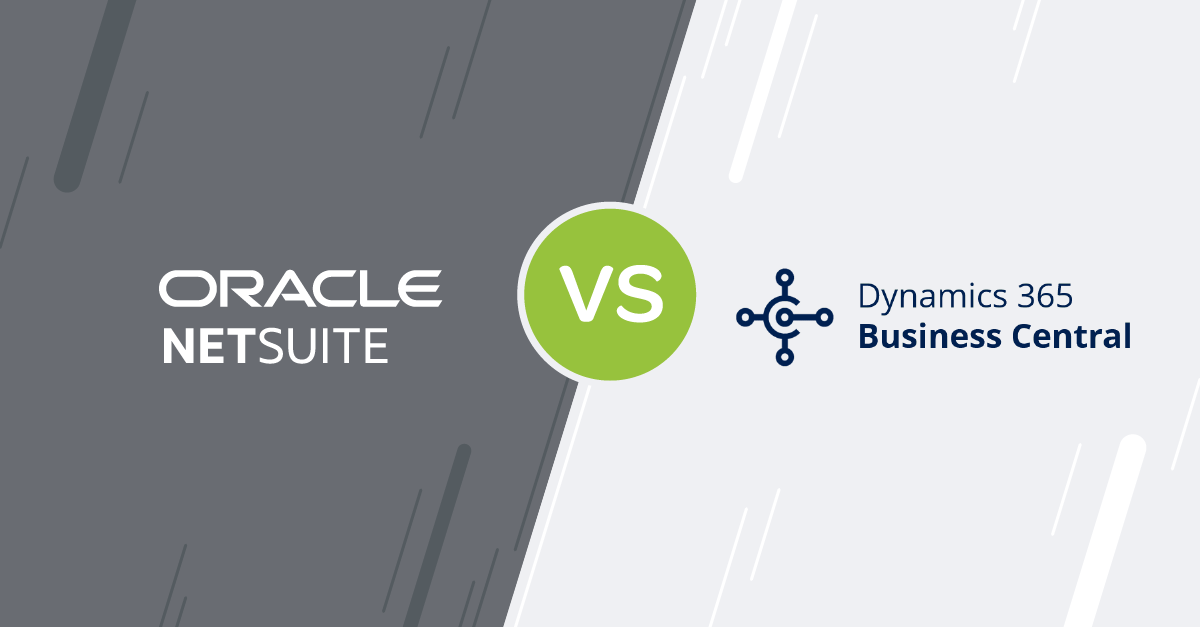Blog
Share this
SAP Business One vs NetSuite [ERP Comparison for SMEs]

by Jalene Ippolito on March 04, 2022
As you’re evaluating ERP solutions, chances are SAP Business One and NetSuite will both make it onto your list at some point. And for good reason – they’re two of the leaders in the small to mid-size ERP space. That’s why we sell both. While they do compete directly, each software has its strengths, things to be aware of and areas of best fit.
We approach our early conversations with prospective customers from a solution-agnostic approach to ensure we find the best-fit ERP solution based on their needs. And we’re taking the same approach here, giving you an objective perspective on both SAP Business One and NetSuite, to help you make an informed decision. If you want help evaluating the two solutions, feel free to connect with us. We’ll get to know your business better and make a recommendation based on your needs.
Have questions about ERP? We've got answers.
Book a quick call with our team to clarify your ERP options and take the next step with confidence. No pressure, no obligations—just honest advice to help you make the right call for your business.
Deployment methods
This is the number one difference you’ll hear about in comparisons of SAP Business One and NetSuite – cloud versus on-premise.
NetSuite is a public cloud ERP solution with a multi-tenant cloud platform that offers easy access to your ERP system through a web browser. You don’t own your ERP software and your data is available to you with a monthly base platform fee, plus a fee for each user. You’ll automatically have access to the latest version of the software and all system back-ups and data security measures are handled by NetSuite.
SAP Business One is traditionally recognized as an on-premise ERP solution, where you house the system on your own servers in your building. You’re responsible for all hardware and infrastructure maintenance and costs. You can also go with a private cloud solution, where a third-party hosts your ERP system in a data center and your users access the system via the internet. This offloads the infrastructure costs the same way a public cloud solution would, but you have the same level of control over your data that you would have with an on-premise system. It’s a blend of public cloud and on-premise, giving you the best of both worlds.
ERP solution licensing and cost
It’s not always easy to get an apples-to-apples cost comparison because NetSuite and SAP Business One use different licensing models. But it can be helpful to understand how pricing is calculated.
NetSuite is a SaaS (software as a service) solution with a monthly subscription fee. The cost of your NetSuite system is based on the size of your company, the modules you implement, the number of users you have and the length of your subscription term. This approach is appealing to many companies because it’s a predictable cost that can be counted as an operational expense, rather than a capital expense. You can also easily scale your user count up and down as required.
SAP Business One uses perpetual licensing, where you own the licenses forever. You’ll pay an annual maintenance fee for each user to access system upgrades, bug fixes and support. With this approach, there’s a higher cost outlay up-front and once you purchase licenses, you’ll pay maintenance on them as long as you run the system.
Control over system upgrades
Because NetSuite is a public cloud solution, new versions are applied automatically. This means you’re always running the latest version with the latest features. One thing to note is that upgrades are deployed to customers on a pre-determined schedule with a small amount of flexibility in the maintenance window. This isn’t necessarily a bad thing, just something to be aware of. Even if the upgrade window falls within a busy time for your business, you’ll need to make time for testing before the new version goes live. If you have any concerns about customizations or integrations, you can mitigate the risk by working closely with your NetSuite implementation partner to create a plan for updating and testing integrations in advance of the upgrade timeline. You also have the option to pay an additional fee to adjust the upgrade timing.
Whether you run SAP Business One on-premise or in a private cloud, you have total control over the timing of your upgrades. You can coordinate upgrades of your ERP system and any customizations or integrations to avoid disruption to the business. Keep in mind that while you can opt-out of upgrades and stay on an older version, you won’t have access to new functionality. And you can typically expect more effort on major version upgrades compared to incremental updates.
System customization and integration
For smaller businesses with relatively simple business processes, standard functionality in either ERP system will likely do the trick. But some companies find they need to customize their solution to accommodate unique workflows or requirements. And while your ERP system houses your core business data, there are cases where you may need to integrate with other applications. In either case, it’s important to understand how much flexibility you have and the limitations of different approaches.
NetSuite is built around a suite of modules that can be added for more advanced functionality. Users can use point-and-click app customization to configure processes, the user interface and reports. The SuiteApp ecosystem of solutions can be integrated to extend functionality. Your NetSuite partner can also customize your system using scripts or custom extensions and integrations using the SuiteCloud Platform.
SAP Business One also offers an ecosystem of certified add-on solutions for industry-specific needs. You can also customize the functionality in SAP Business One with tools like Boyum B1 Usability Package or the Software Developer Kit (SDK). You also have the flexibility to extend your ERP solution or integrate with best-of-breed applications.
Regardless of the solution you choose, when it comes to customizing your ERP solution or integrating with other systems, we recommend working with a qualified ERP partner. Unless you have the in-house expertise, a partner with ERP development experience is your best bet to ensure a seamless solution.
Implementation approach
NetSuite implementations can take a couple different forms. The SuiteSuccess model provides a fixed price implementation that’s designed based on industry needs and best practices. This gets you up and running quickly while keeping costs low. This approach can work well for companies that have simple, standardized processes. If you have more complex needs and require significant customization or integration, you'll likely be a candidate for a more traditional time and materials implementation.
SAP Business One projects can be implemented in a comparable timeframe. But they’re typically priced based on time and materials, which introduces greater cost variation. The benefit of this implementation approach is an ERP solution that’s more tailored to your business needs.
With either solution, you can keep costs in check and mitigate the risk of scope creep by finding an implementation partner that uses a hybrid approach. They charge a fixed price for system design, then time and materials for the implementation.
Ability to migrate your data to another ERP system
When selecting your ERP solution, you should always understand your exit options. You should only need to migrate to another solution if you outgrow your current one, or if it simply doesn’t meet your needs as expected. (This is an unfortunate situation that does happen sometimes – you can avoid it by selecting the right ERP system the first time.)
While you can absolutely get your data out of NetSuite, it won’t necessarily come in a relational format. You’ll likely end up with a series of spreadsheets that you'll need to parse through before migrating into a new system.
If your SAP Business One system is hosted in a private cloud, you can obtain a copy of the ERP database or get copies of the full virtual machines (i.e. the servers) that are running your ERP system. This makes it easy to move your existing solution to another private cloud provider (or on-premise) with minimal fuss. But if you're moving to a new system altogether, you'll be exporting into spreadsheets for data migration, same as you would with NetSuite.
The reality is that if you're switching to a new ERP system, you'll be importing data via spreadsheets anyway. So, having a copy of your database may not be all that important. The point here is to always read the fine print in your contract so you understand how you’ll obtain your data if you decide to move to another ERP system in the future.
Which ERP is the better choice – SAP Business One or NetSuite?
We’re big believers in the right solution for the right company.
What does that mean? There’s no one single ERP solution that will be best fit for every company. At the end of the day, the best ERP solution for your company is the one that meets your needs and helps you achieve your objectives.
Share this
Stay in the Know!
Join other SMEs who receive our monthly ERP insights, tips and best practices.
You may also like

ERP Funding for Canadian Businesses

Should You Work with a NetSuite Implementation Partner or Go Direct?



